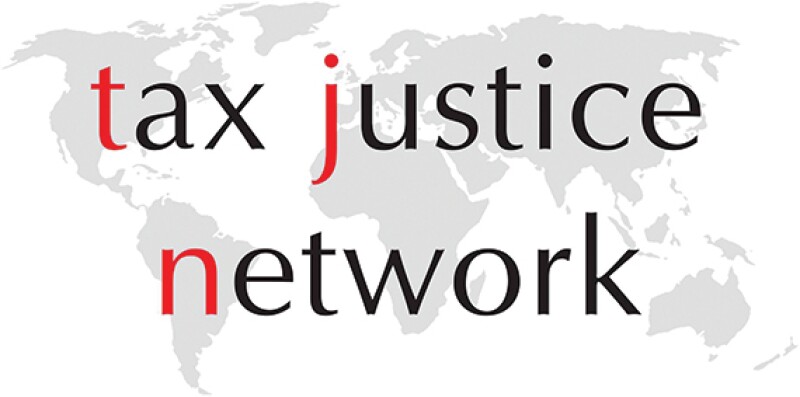
|
Tax Justice Network was also in the Global Tax 50 2016, 2015, and 2014 |
Tax Justice Network (TJN) is instrumental in driving the momentum for change in fairer tax policies around the globe. Each year, the NGO directs its gaze to a particular global tax issue, and each year it launches effective campaigns that influence the successful adoption of legislation or sees substantial taxation advances. Over the past 12 months, it:
Campaigned for stronger coordination and cooperation at a global level to combat tax competition, as well as helped identify the ideology that drives tax competition, particularly for larger economies;
Stressed the importance to countries not to seek a "level playing field" through competitive financial regulations;
Recommended the adoption of a unitary tax and country-by-country-reporting (CbCR) to deter aggressive tax structures by corporations;
Shifted the perspective of tax compliance to be at the forefront of corporate social responsibility;
Identified three main concerns with tax treaties, such as double non-taxation, source and resident discrepancies and the lack of exchange in information, which require a restructuring of many agreements between countries; and
Offered a colossal amount of information to adjust harmful transfer pricing practices.
International Tax Review caught up with TJN Director John Christensen to discuss his organisation's work around what it sees as the biggest issue of the past year in tax: the 'race to the bottom' on corporate tax rates.
"What we are hoping for is a recognition that endless corporate income tax cuts will not stimulate investment," says Christensen. "What we're trying to do is create a global conversation around this and it's not just around tax it's about regulation, a certain amount of protections and indeed environmental protections. We're saying this race to the bottom is harmful, undermines democracy and will only benefit a very narrow moneyed elite."
TJN is building momentum to expose and counteract the race to the bottom. Behind the scenes, the network has been talking to governmental officials in different countries as it expects that it will become one of the biggest tax issues in the next decade.
In 2018, British author, journalist and TJN writer Nicholas Shaxson will be releasing a follow-up to his 2011 book 'Treasure Islands', specifically focusing on the race to the bottom. It's called the 'Finance Curse'.
Alongside that, Christensen says he has been working on a documentary with filmmaker Michael Oswald that will be released in early 2018, which looks at the political language used by nations competing against one another through tax rates.
The TJN's strength is its ability to bring together researchers to find solutions to global tax issues. It establishes its community by listening to what people in different countries want in the way of research and then organising workshops in one country or another. In 2018, a TJN workshop is due to be held in Lima, Peru, with the idea of picking up on a theme of global interest and putting out a call that invites scholars to build a research community on the subject. However, 15 years ago it was quite difficult to do just that. "There weren't that many scholars, now we are overwhelmed with the amount of scholars and the brilliant young people who are coming forward because the whole issue is now opened up. There is a huge interest coming from younger researches and I think that is one of our greatest successes," says Christensen.
Ironing out issues in transparency initiatives has also become a core concern for the TJN. Christensen says there is still more work to be done on public beneficial ownership registrations, for instance. "I think the Paradise Papers will build pressure for that kind of public transparency, but we are not there yet," he says.
On the common reporting standard (CRS), mass adoption across all countries must become the norm, Christensen says. He feels the resistance coming from politicians is partly due to a combination of lobbying efforts and political funding, but that it is evident the public believes it is time to end financial secrecy. "With democracy so much under threat, the fourth estate is proving its value," Christensen adds.
The TJN has called upon the UN to convene a global summit to end tax abuse and financial crime because the political kickback from countries like the US and UK is so great that the OECD has been effectively blocked from going as far is necessary.
The TJN's research has been fundamental in supporting debates for legislative action. Without this effort and attention to raising awareness, many aggressive tax strategies would still be around today. "I've been formally the director of TJN for 15 years now and what I'm proudest of is the fact that we've built this large research community that works really effectively with the broader civil society. I think that's our greatest achievement," Christensen concludes.
The Global Tax 50 2017 |
|
|---|---|
The top 10 • Ranked in order of influence |
|
6. Arun Jaitley |
|
The remaining 40 • In alphabetic order |
|
| The Estonian presidency of the Council of the European Union |
|
| International Consortium of Investigative Journalists (ICIJ) |
|
| United Nations Committee of Experts on International Cooperation in Tax Matters |
|









